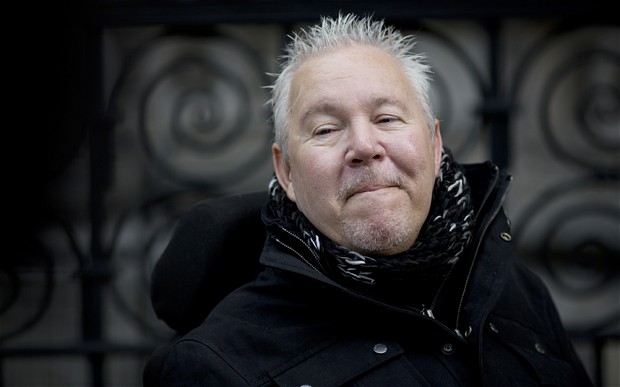Paul Lamb is wrong. There is no such thing as a ‘right to die’
written for The Telegraph, 26 June 2014

Paul Lamb outside the Court of Appeal. (Photo credit: Christopher Pledger for the Telegraph)
It’s hard not to feel for Paul Lamb, paralysed in a car crash, who yesterday lost a court battle to win the right to a doctor-assisted death. Outside the court, Lamb (a lively and engaging fellow, sharp and engaged with his court case) told the media of the pain caused by his disability: “I haven’t committed a crime, I don’t deserve to be punished like this”. Of course Lamb doesn’t deserve it. The problem is, however, that most of us don’t deserve the suffering we encounter in life. We don’t get the rewards our virtues deserve, either. And when society tries to ensure that we do, things go very wrong indeed.
Lamb talks about his suffering as “punishment”, albeit punishment undeserved, as if life’s hopes and fears were simply functions of a cosmic computerised justice system, malfunctioning with a bug. Is there any crime he could have committed for which paralysis could be considered a fitting punishment? Unless we’re in Saudia Arabia, the answer is surely not.
So disability isn’t a punishment, and to consider it as such is an insult to every quadriplegic who has made something of his life (with shades of Glenn Hoddle). But to be fair to Lamb, he sees himself as a campaigner for disabled rights – “this country prides itself on treating disabled people the same as able-bodied people; this is discrimination, because able people [are physically capable of suicide]”. But just because able-bodied people can and do commit suicide – always a terrible thing, always cataclysmic to the people around them – doesn’t mean disabled people should. If we could stop each and every able-bodied person from privately committing suicide, we should. There’s a reason volunteers patrol the cliffs at Beachy Head.
Because at the heart of this lies our chronic addiction to the language of rights. As a society, we can afford civil rights to each other, but whatever Locke might have thought, when it comes to the fundamentals of birth, death, love, sex, the world has never been able to provide satisfactorily for us. How can we claim the right to a life without pain if none of us have ever known one? Is the government in breach of contract when it fails to stop my heart breaking?
We all start life with a set of advantages and disadvantages. They’re rarely the same, and whatever the hard Left may think, not easily computational. (Is 5 per cent more inherited wealth a fair trade for a heart defect? 10 per cent? 15 per cent?) “The disabled”, themselves, are far from a homogenous group, and it’s dangerous to think of an ideally “able” person, against which all other experiences of the world must be measured. Paul Lamb’s vision of the world (and who could not be compassionate towards him?) proposes that to be equal, we must all be the same. And that it’s the government’s job to ensure that. If an able-bodied person is physically capable of committing adultery, must we arrange for the disabled to be given mistresses, and in secret, too? Neither suicide nor infidelity are helpful things for the government to ban, but neither are to be encouraged.
So if a “right to die” is something more than the fungal spread of litigious entitlement language, it’s because we think of birth and death as something more fundamental than the right to sue for whiplash. Yet it is precisely at those fundamentals that our decisions have the greatest effect on the network of other individuals amongst whom we live. This is where coercion, moral blackmail, and self-sacrifice become hardest to disentangle. Even the best intentioned carers find themselves willing a loved one’s death, from sheer exhaustion. An Indian friend recently told me of the suicide of his frail grandmother. She’d left a note stating that she didn’t want to be a burden – her grandson, who loved every moment with this burden, blamed her daughters-in-law, who’d kept up a relentless campaign of subtle whispering and complaints, winking and nudging, about the extra mouth to feed. If we think we are a superior society, one where individual choice is unfettered, where social pressure does not exist, where we never make our elderly feel surplus to requirements, we delude ourselves. We need only look at the scandals in our care homes to know the truth about ourselves.




